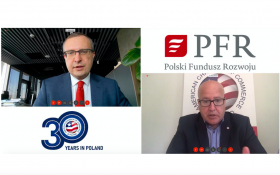- 14 lipca 2020
- Category: Community News

In July, AmCham held a special Monthly Meeting, with members from the International Group of Chambers of Commerce, who joined the video meeting platform provided by Cisco. AmCham had taken over the IGCC chairmanship at the beginning of July and invited IGCC members to the Monthly Meeting in July.
The guest speaker was Paweł Borys, President of the Polish Development Fund (PFR), a government-affiliated institution designed as a vehicle to drive growth, innovation, and the development of the Polish economy.
Borys met AmCham members to talk about the PFR response to the Covid-19 situation and highlighted PFR programs which aim at helping Covid-19 stranded companies maintain their cash-flow, keep jobs, and survive the crisis relatively unharmed.
Borys explained that among PFR investment priorities, there are projects addressing infrastructure, climate change and the transformation of the Polish energy system into a carbon-neutral one. The fund also boosts local development by allocating investment money to local and regional governments.
In addition, since last year, the PFR also handles a government-sponsored reform of the pension system which implements the existing ZUS system—the Employee Pension Fund.
However, after the Covid pandemic hit the country, the government has extended PFR responsibility to cover anti-crisis financial aid. The largest aid program, called the Anti-Crisis Economic Shield, was launched in April, catering to small and medium-sized enterprises. They can seek financial assistance from the shield, applying for it through their banks, and use it for up to 12 months.
Looking at the program execution over the last two months, Borys said it was very successful delivering financial assistance totaling PLN 57 billion (which amounts to nearly 3 percent of Poland’s GDP) to over 320,000 small and medium-sized companies.
Borys said that a part of the success was that it worked fast. Companies could apply for the aid online, which significantly cut the time the PFR needed to process the red tape. This allowed the PFR to transfer money to companies that met the aid criteria within one or two days from the day on which they submitted their application.
In June, following an approval from the European Commission, the PFR opened an aid program for large enterprises. Companies with operating loses generated during the economic lockdown can apply for liquidity loans, preferential loans, and a number of capital instruments to use as liquidity loans.
The key objective for the government is to help those companies so they do not cut jobs, and to maintain proper liquidity in the corporate sector.
The key criterion for getting the aid to a company is that it has had 25 percent drop in revenue or higher, measured on a month-to-month basis.
This type of aid is very important, especially for companies that generated an unsustainable debt during the lockdown. The PFR may turn that debt into loans or company shares.
The speaker said that it was not a PFR intent to take ownership of companies that have problems during the pandemic. After some time when the going gets better, the PFR will sell back its stakes back to those companies.
Currently, over 400 companies have applied for the aid, but, according to Borys, up to 600 large enterprises will be beneficiaries of the PFR aid program eventually.
Closing his presentation Borys encouraged AmCham members and the all members of the international business community in Poland to contact PFR representatives for information regarding PFR aid programs and guidelines on how to apply.